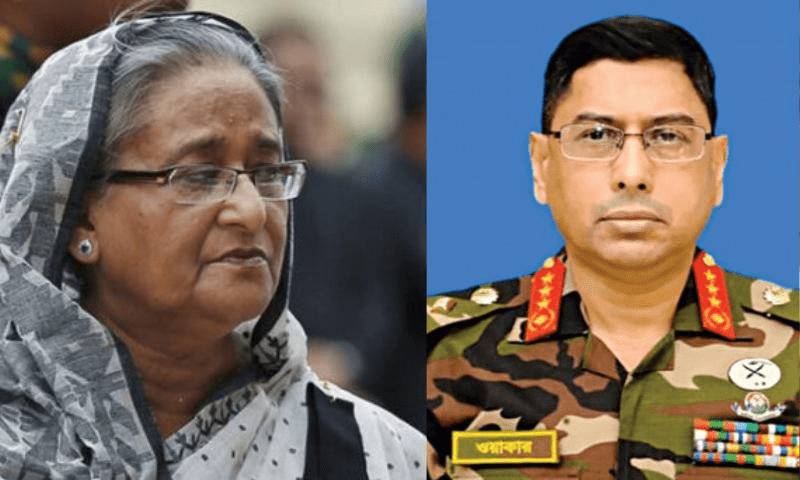
Bangladesh Prime Minister Sheikh Hasina Resigns and Flees Country as General Waker-uz-Zaman Takes Control Amidst Massive Protests and Unprecedented Violence
Fiona Nanna, ForeMedia News
5 minutes read. Updated 7:00AM GMT Tues, 6August, 2024
Prime Minister Sheikh Hasina of Bangladesh has resigned and fled the country, marking a significant upheaval in the nation’s political landscape. The resignation, which occurred on Monday, followed weeks of escalating protests against a controversial quota system for government jobs. The demonstrations, initially sparked by student grievances, have grown into a widespread challenge to Hasina’s 15-year rule, culminating in severe violence and political instability.
Widespread Unrest and Violence
The resignation comes after thousands of demonstrators breached Hasina’s official residence and other buildings linked to her party and family. The scenes of chaos were stark, with protesters storming the premises, looting, and vandalizing properties. Reports indicate that the demonstrators not only raided Hasina’s residence but also targeted her family’s ancestral home, which had been converted into a museum dedicated to her father, Sheikh Mujibur Rahman, the nation’s first president.
The unrest, which has led to significant property damage and the destruction of major ruling party offices and pro-government media outlets, highlights the depth of public frustration. Major television stations supportive of the ruling party were forced off air due to the violence.
Military Intervention and Government Response
Following Hasina’s departure, the country’s military chief, General Waker-uz-Zaman, addressed the nation in an attempt to restore calm. General Waker-uz-Zaman, who has met with opposition leaders and civil society representatives, assured the public that an interim government would be formed with the guidance of the president. The general also promised a thorough investigation into the deadly crackdown on student-led protests that resulted in some of the most severe bloodshed since Bangladesh’s 1971 war of independence. He emphasized that security forces had been instructed not to use lethal force against protesters and pledged to hold accountable those responsible for the violence.
Despite these assurances, the situation remains tense. As General Waker-uz-Zaman spoke, crowds continued to besiege Hasina’s properties, with some individuals removing furniture and others taking food from refrigerators.
Political Fallout and International Reactions
The protests began last month as students demanded the abolition of a quota system they believed disproportionately favored individuals with connections to Hasina’s Awami League party. The demonstrations, initially peaceful, soon evolved into a broader challenge to Hasina’s administration, reflecting widespread dissatisfaction with her governance.
Hasina’s political tenure, spanning over 20 years, has seen her face numerous accusations of autocratic behavior and human rights abuses. Her recent departure adds to the mounting criticism from Western nations, including the United States and the United Kingdom, which had previously condemned the questionable credibility of January’s election—a vote boycotted by her main political opponents and marred by widespread arrests of opposition members.
In the aftermath of her departure, the focus now shifts to the interim government’s ability to navigate the country through this turbulent period. The violence has resulted in at least 95 deaths, including 14 police officers, with hundreds more injured and over 11,000 arrests made. The unrest has also led to the closure of educational institutions and the imposition of a curfew in some areas.
With Hasina having reportedly landed in a city in India, the future of Bangladesh remains uncertain. The ongoing turmoil poses significant challenges for the country, which is already grappling with high unemployment, corruption, and the impacts of climate change. The international community will be watching closely as Bangladesh navigates this period of profound political and social upheaval.

